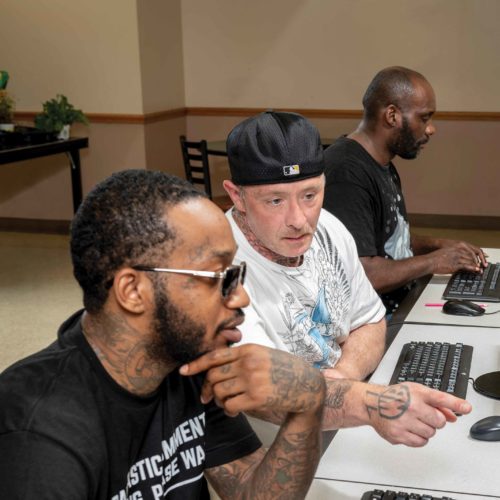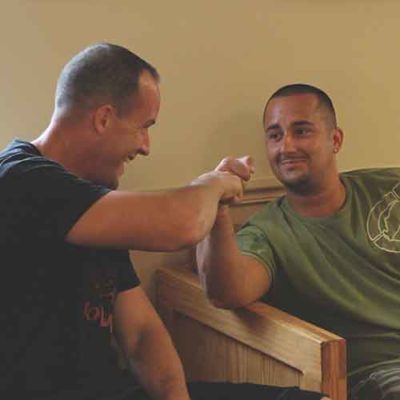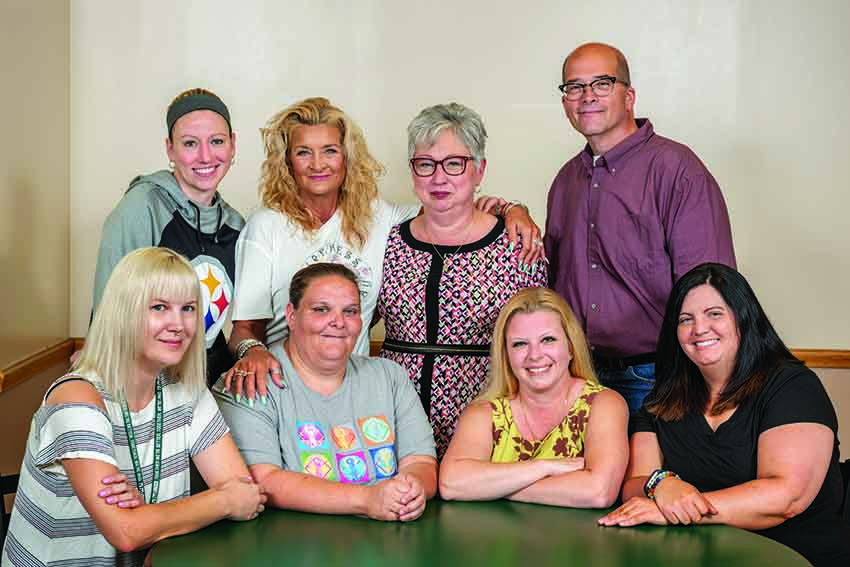
CORE Values
Kevin Kordzi has been the director at RHD CORE, RHD’s first addiction recovery program in Western Pennsylvania, since the program was founded in 2013. Still every day at CORE, a long-term community residential program for individuals with mental health and substance abuse issues who are returning from prison, the work amazes him.
“The thing about working with people in drug and alcohol recovery is the courage and strength they bring to the table,” Kordzi said. “When you think of the 12 steps of Alcoholics Anonymous or Narcotics Anonymous, the fourth step is to complete a searching and fearless moral inventory. And I routinely ask myself, who in their right mind who is sober would take that task on? Who would pass that kind of judgment and do that kind of exploration of themselves? And yet the folks that I’ve worked with do it with such willingness and openness, to look at those things and deal with painful, hurtful things that have happened to them over the years. For me, seeing that strength and that courage is what keeps me going.
“It’s not something that happens overnight and oftentimes folks have to keep trying. But to see that resilience and willingness to keep working at it and keep giving it a shot, and not allowing themselves to settle, I’m willing to keep working with them as long as it takes.”
That tenacity of service is one of the reasons CORE has been so successful — 98 percent of CORE clients remain in recovery after leaving the program, and one year after discharge 83 percent have not re-offended.

RHD in Western Pennsylvania
RHD supports more than 300 people each year in programs providing a diverse array of services in Western Pennsylvania. “RHD in Western PA is a lot of things — but one thing it always is, is growing,” said Jeff DeSantis, RHD Regional Director. “Our services are very much centered in the community where they exist. We employ people from the community. We serve people from the community. When RHD is part of a community, we think it’s very important to let that community be part of us.”
“Most residential treatment programs are consequence-oriented and rules-focused, but we’re different,” Kordzi said. “The population that we work with tends to be somewhat oppositional by nature, so when one of the first things they get handed when they walk in the door is a set of rules, that’s what they focus on — and really how to work around those rules, because that’s how they’ve survived their entire lives. CORE works to incorporate the philosophy of a recovery-oriented system of care. That doesn’t mean people have a free rein to do what they want. It’s about how issues that come up are dealt with. Rather than simply handing out a consequence or punishment, the purpose of the philosophy of this program is to engage that person in a conversation, to talk about their thinking and decision-making. We make connections for them between those short-term decisions that may not seem like they have real consequences, but how it’s a similar thought process that is involved with justifying or rationalizing using, or any other pattern of behavior that has led them to be here.
“If people are in an environment that is primarily about rules, when they leave those rules don’t go with them. Part of what we do with our clients is by having those conversations with them and really engaging them, using motivational interviewing techniques to get them to take ownership and responsibility for their own recovery, they then work with us, rather than just complying. We really have cooperating partners in the process.”
CORE is one example of RHD’s person-centered, trauma-informed addiction recovery services. RHD recognizes that there isn’t a one-size-fits-all approach to addiction recovery. RHD offers a variety of confidential, innovative, and person-centered recovery plans that take into account where people are in their unique stages of readiness to begin their recovery process, and RHD has been at the forefront of dual diagnosis programs that treat addiction and mental illness.
RHD believes services treating substance use disorder are most effective in a recovery-oriented environment. This approach helps program participants develop their own “blueprints” for success that support successful living in the community. RHD Addiction Recovery Services meet the treatment needs of participants with cutting edge, coordinated clinical responses. RHD delivers evidence-based practices in an environment dedicated to healing, wellness and choice.
“We’ve all been in different programs,” said Bud, a CORE client. “And everybody here says the same thing — it’s never been like this. People are excited to be here. They’re excited. Here it’s totally different than a rehab. It’s a place for recovery.”
“I’ve had an excellent experience,” said Tim a CORE client. “They’ve helped me get in touch with myself. I’ve learned relapse prevention tools. The counselors are awesome. The treatment approach is phenomenal. They basically guide; we’re pushed to do work on our own. We’re challenged — they give us the toolbox, but up to us to pick up the tools and use them.
“The big thing for me is the length of the program. I spent a lot of time in jail. Coming from incarceration, I had a lot of barriers to tear down. This is the best approach out of any treatment I’ve ever been at. Coming here for six months has really helped me hone in on some things.”
Like all RHD programs, CORE works to create a trauma-informed atmosphere that builds a safe space for people to do the difficult work of recovery.
“Rather than looking for trauma in the clients who we work with, we assume that people in the program have a history of trauma,” Kordzi said. “Creating an environment that is trauma-informed ties in very nicely with the recovery-management model that we use. We try to create a safe space, to create a program that folks feel safe in, feel comfortable in, feel that they’re not being threatened, or that staff are not spending all their time and energy trying to catch them doing things in order to punish them.
“The primary motto we have at CORE is to take a risk and do something different. In order for me to expect clients to do that, they’ve got to feel that they are in a safe place. Coming from a trauma-informed approach allows them to feel safe, and allows them to feel they can take that kind of risk and do something different than they’ve done in other programs, or in other areas of their life.”
“I’ve built trust here,” said DuJuan, a CORE client. “I’m very thankful and blessed to be able to come into this atmosphere of recovery. It’s been challenging; you can come into a facility with an idea of what it’s going to be like, but this was totally different. Here people genuinely care. I know people use that word a lot, but I mean here people are invested in my recovery, they’re invested in my treatment and my counseling and they’ve showed me the value of being invested in it as well.”
Mike has been at CORE a short time, but he knows the most important thing is not what happens here, but what happens when he leaves here.
“This is the easy part, the hard part is having the ability to make it out there,” Mike said. “I’m learning things about myself, how to approach situations, learning how to say no, learning how to walk away — play the tape all the way through, is how they say it. They want to see me do good. They truly care. I know I’ll come out of here very confident in staying clean and wanting to stay clean.”




